Video
A quick 10 minutes video to get you started.
Since this video was produced, there have been small changes that are reflected in your booklet:
- The 17 Coin cards have been replaced by 4 Coin cards and 4 Coin Indicator cards.
- The special 10 cards rules for 4 players has been removed.
- The +1 Discard is not optional, and must be applied if possible.
Beginner Game Mode
To set up a beginner game, you may exclude up to 11 cards for a 2 to 3 player game.
No cards can be excluded for a 4-player game and therefor we do not recommend this player count for a first
experience with DeckHand.
Feel free to remove any cards you find complex or that might slow down the game. Here is a suggested list:
- The Grand Council
- Gold Mine
- Bewitched Doll
- Imperial Powder
- Typhoon
- Monkey's Bargain
- Governor's Wedding
- Kraken's Fury
- Ghost Crew
- Improvised Grenade
- Going Ape
Rapid Fire Game Mode
For players seeking a faster and more dynamic experience with DeckHand, consider this extended game mode to help players acquire cards more quickly and enable more combos in the late game.
- Starting Coins: Each player starts with 3 coins instead of 1.
- Supply Cards: Setup the supply deck with 15 cards per player instead of the usual 11. For a 4-player game, use 13 cards per player instead.
- Reloading Cards: Before the game starts, all players but the starting player might reload a card from the supply. Then shuffle the reload deck. This allows players to flush out cards that might be considered unfair, such as Merfolk Mercenary, Treasure Hunt, or Seaside Citadel.
- Crew Expansion (if available) : Deal a hand of Crew cards equal to the number of players plus 2 to the player sitting to the left of the starting player. This player chooses one Crew card and places it face-down in front of them, then passes the remaining Crew cards to the left. This continues until each player has one Crew card. Shuffle the remaining 2 cards back into the Crew deck.
- No Action Limit: There is no more limit to the number of actions you can use each turn.
Game Board Illustration for 1 Player

Solo Challenges
To set up a solo challenge, follow the setup for a 2-player game but
add an extra card to the supply deck (23 instead of 22).
Take turn after turn until the game is finished, but at the start of each turn, remove one card from the supply.
This creates a natural clock that you have to beat.
During solo challenges, you take charge of making decisions that enemies would typically make.
If an effect targets an enemy, disregard the targeting aspect of the effect,
while other parts of the effect still take place.
Victory Beast Solo Challenge
Aim to finish the game with at least 32 victory points.
Attack Freak Solo Challenge
Aim to finish the game with at least 26 victory points and at least 9 Attacks.
Architect Solo Challenge
Aim to finish the game with at least 27 victory points and at least 8 Structures.
Rules

What does then mean on cards such as Tavern and Exploration?
In DeckHand, then is never used as a condition but always to emphasize that things need to happen in a sequence. On Tavern, the "then" is there to convey that you should draw before checking the rest of the conditions. On Exploration, it should be understood "Additionally."
What happens to the supply when the supply deck runs out?
Players can buy from the supply, but the cards are not replenished. Naturally, nothing can be bought if there are no face-up cards left.
What happens when my stash and deck are empty?
Nothing happens at first. However, as soon as one or more cards enter your stash, the normal rules applies, and you must immediately reform a deck. Cards discarded together (e.g., with Alchemy) enter the stash simultaneously.
Card details and Explanations
Here are some insights on some of the most distinctive DeckHand cards, including a few that may need further explanation. If after this read you still have questions, join the discussion on Discord or Board Game Geek.

Celebrate
Once you play a card, that card is considered out of your hand. Therefore, Celebration can only give you 1 coin at best unless you manage to introduce a third Celebration into your deck. Celebration is designed to be a decent card initially but becomes progressively less effective as the game progresses.
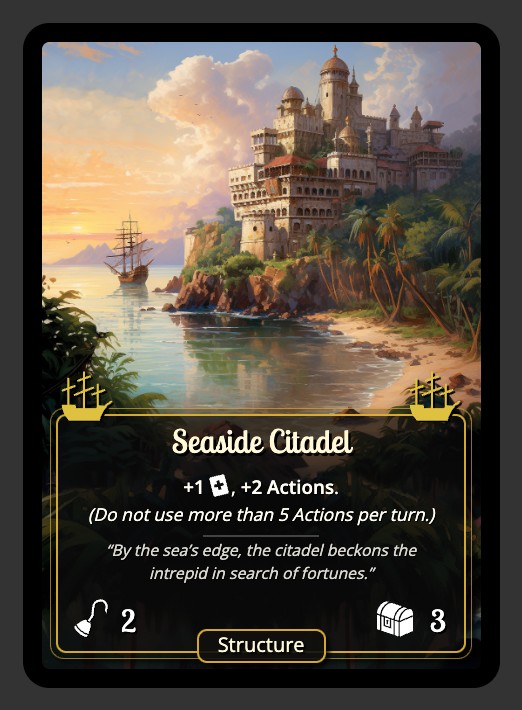
Seaside Citadel
Extra Actions are almost always beneficial, especially when they come with an additional card. If you play Seaside Citadel as your first card, you will have 3 Actions remaining once fully resolved (2 starting Actions - 1 to play Seaside Citadel, +2 from the effect). Actions can be used for playing or buying cards in any order or combination, and your 2 starting Actions are no exception.
Keep in mind that once you have used 5 Actions, which include playing and buying cards, your turn is over. However, extra Buys you obtain from cards like Haggling (+1 Buy) are not counted as the rules state: "You may buy 1 card without using an Action this turn."

Wind in Sails
Wind in Sails is a start-of-turn card that grants you a 4-card draw instead of 3,
simply by sitting in your stash.
As the game progresses and your stash grows, its effects continue as long as it remains in your stash.
If this card ends up at the bottom of your deck, you may consider it unlucky,
but there's a chance to strategically place it at the bottom of your stash
if you play your cards right.
Note that if you play Wind in Sails with only one card left in your deck, and decide to draw it, Wind in Sails won't be shuffled back into your deck. It goes into your stash after resolving all consequences, including the shuffle.
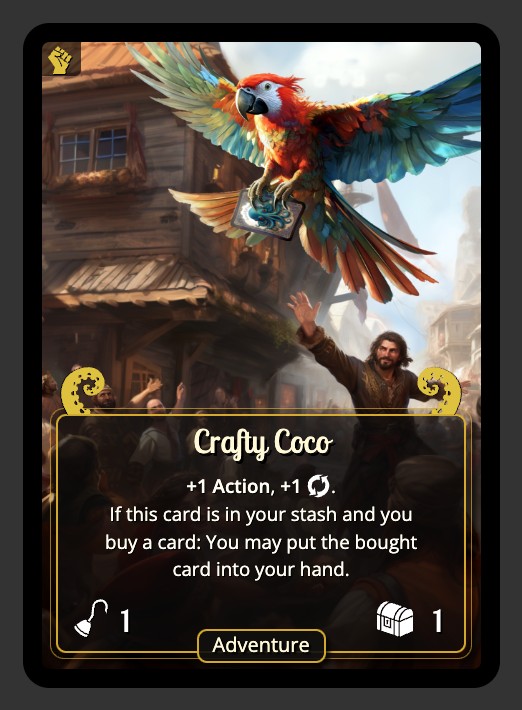
Crafty Coco
Crafty Coco is a card that permanently changes the rules of the game as long as it is in your stash. Start-of-turn and Rule-change (indicated by the fist icon) cards are cumulative, making them all active at the same time. The order in which they appear in the stash is inconsequential.
Crafty Coco might be a challenging card to take advantage of unless you start your turn already wealthy or manage to buy a "When discarded" card. In the latter case, you will naturally benefit when it is discarded at the beginning of your next turn.
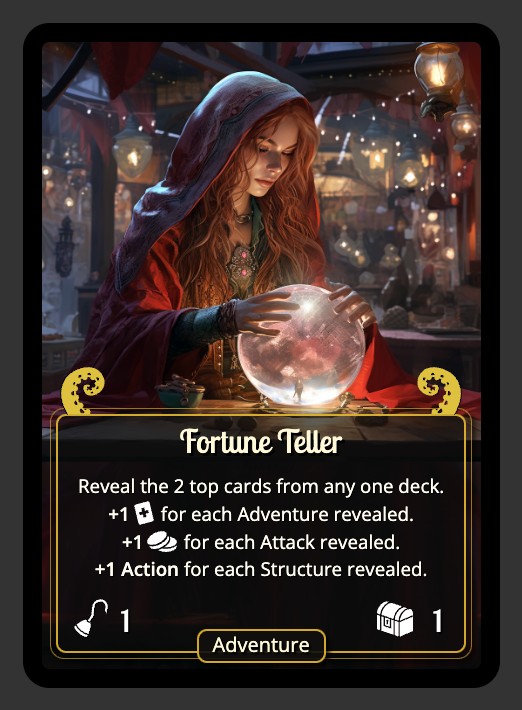
Fortune Teller
The Fortune Teller opens up possibilities by allowing you to target any deck, whether it's your own, an opponent's, the supply deck, or even the reload deck.
Use it strategically to try to obtain what you need, whether it's extra Actions, coins, or cards. Additionally, it can be employed to gain insights into an opponent's top cards, enhancing your ability to use cards like Desperate Chase or Voodoo Curse effectively.
If you reveal cards from a deck with just one card, you would reveal only that one card. According to the general rules, looking at cards does not empty the deck, so it wouldn't trigger a shuffle.
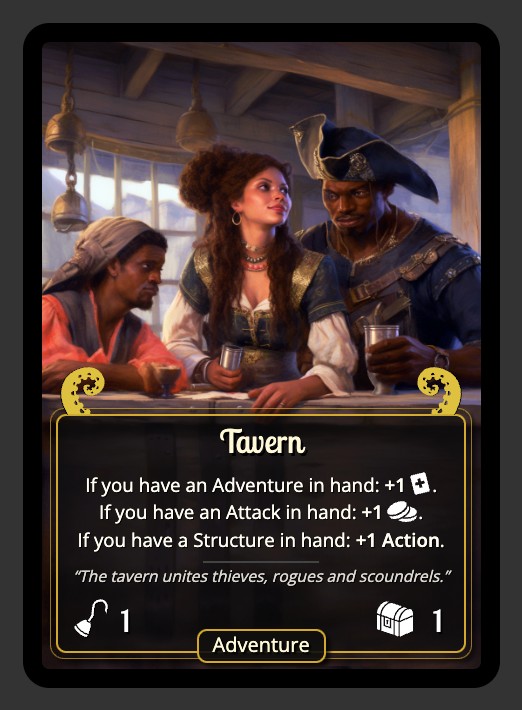
Tavern
Start by drawing a card if you have an adventure, then assess the other conditions. This improves your chances of obtaining the card's complete benefits. It's important to adhere to the general rule that effects should always be resolved step by step, without re-ordering.
In the 1st printed edition there is a "Then" on the second line that you can disregard.

Desperate Chase
You can play Desperate Chase if both you and a chosen enemy have at least 2 cards in your respective decks. Then, reveal up to 3 cards. If there are only 2 cards in a deck, follow the general rule: If an effect cannot be fully applied, it still applies partially, to the extent possible. So, in this case, reveal only 2 cards from the deck.
According to the general rules, revealing cards does not empty the deck, so it would never trigger a shuffle.

Exploration
If you have an Adventure card in your hand, you gain an additional Action. In addition to this, you draw one card and gain one coin.
The order of resolution is such that you first check the condition of having an Adventure card, and if met, you gain the extra Action; then, regardless of whether the condition is met or not, you draw a card and gain a coin.
This order has been chosen for game balance reasons; drawing the card first would dramatically increase the likelihood of gaining an extra Action.
In the 1st printed edition there is a "Then" that has been replaced by "Additionally".
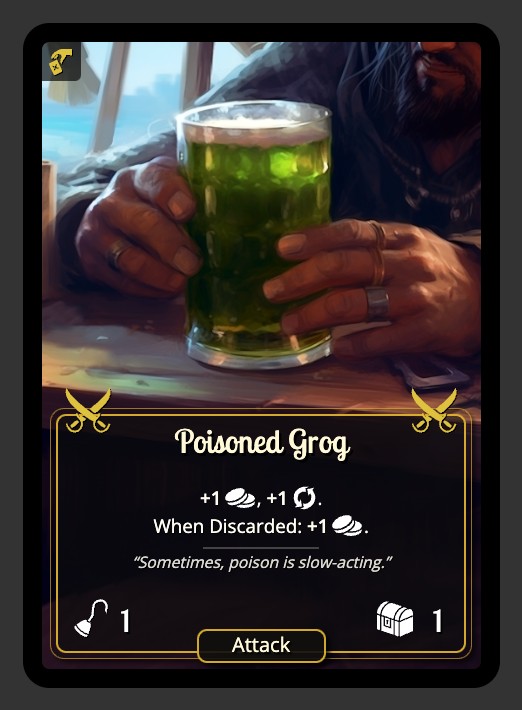
Poisoned Grog
The Poisonous Grog is a card that is often better off discarded than played. You'd consider drinking the Grog yourself only in dire circumstances.
The discard effect happens naturally at the beginning of your turn. But a few cards in DeckHand might enable you to discard Poisoned Grog a little bit sooner (Typhoon, Alchemy, Rum Factory).
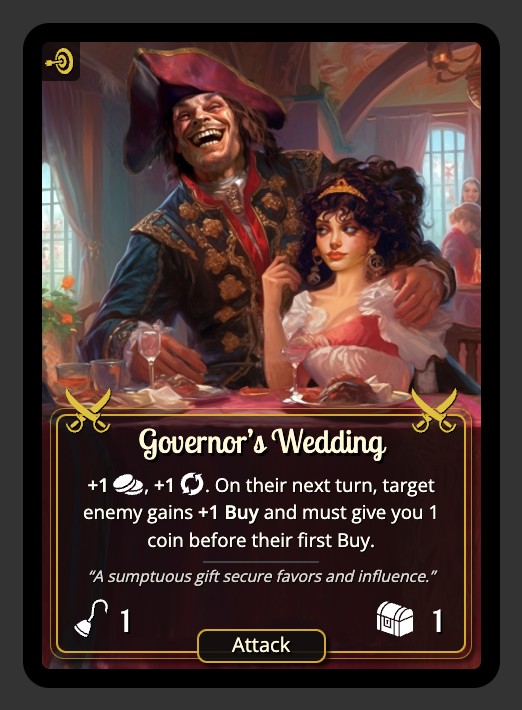
Governor's Wedding
When you extend a wedding invitation, you anticipate a thoughtful gift in return. But is this complimentary Buy truly worth the coin offering? Your opponent might think otherwise, and your generous invitation might be rudely rejected (by refusing to Buy), and you will receive no gift in return.
The Governor's Wedding can be mutually beneficial, potentially allowing 2 weaker players in a 3-4 player game to support each other.

Bewitched Doll
This card exerts quite an intrusive effect on one of your opponents. When you play it, you gain control of their cards, coins and execute their first Action on their turn.
If you generate additional Actions or Buys by this control, you maintain control for those as well if you wish. if you do not the controlled player will have the opportunity to use them. In any case, you must follow valid game rules and not make nonsensical plays. For Example, it is not allowed to play Karmic Elevation and not pay the coin, or if there is no valid card to swap.
But otherwise, you have a wide range of possibilities. You could even use the Improvised Grenade on their own stash. The question is, what kind of damage are you able to inflict to make this card worth playing?
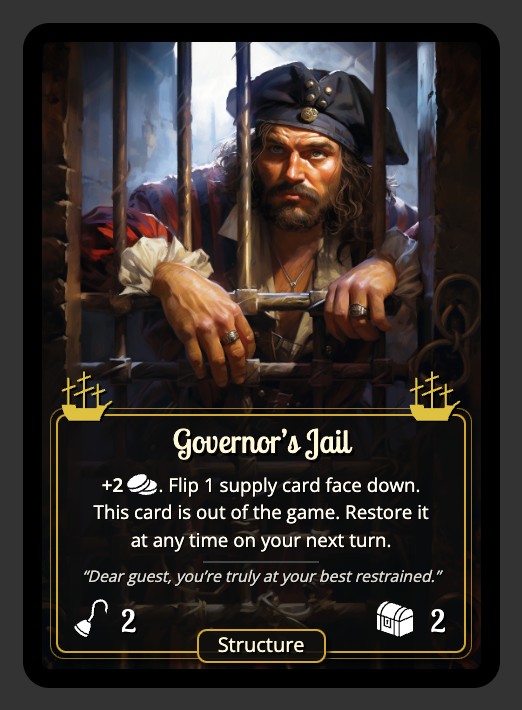
Governor's Jail
Getting 2 coins is already a good deal, but the ability to block a supply card for a turn opens up multiple strategic possibilities. You can use it to reserve the card for yourself, preventing an opponent from acquiring it. Additionally, you can influence any cards that interact with the supply to your advantage.
While the card is face-down, it cannot be interacted with in any way. It is like it doesn't exist. However, it still occupies one of the six slots in the market. You restore it by simply flipping it face-up on your next turn.
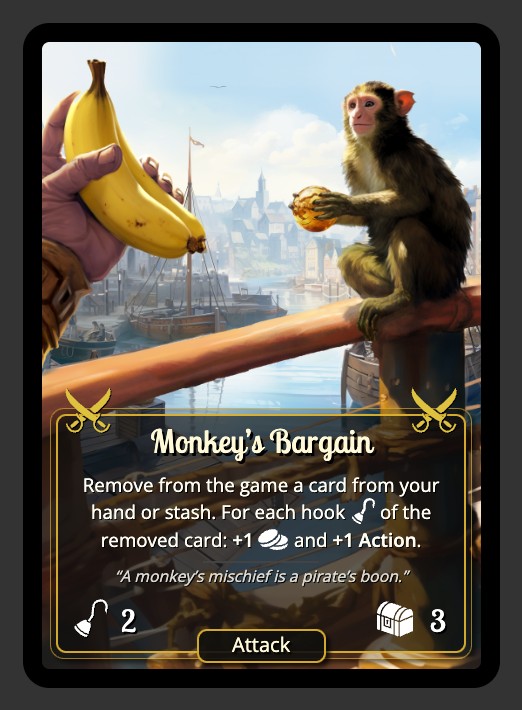
Monkey’s Bargain
The temptation to remove your weaker base deck cards is strong, but have you considered parting with a higher victory point card? Your decision hinges on whether you can make the most of those extra Actions. Choose wisely what to trade with the Capuchin monkey.

Gambling Addiction
DeckHand has an equal amount of Attacks, Adventures, and Structures. You could calculate your odds and make a rational choice, but can a real Pirate ever be truly rational?
When you have 2 reloads, you play them consecutively, and they are always optional. That means you could do 1 reload and stop there if you are satisfied.
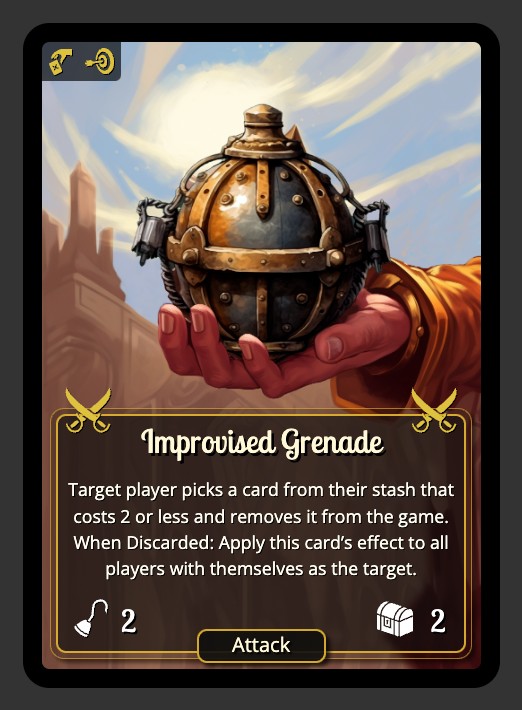
Improvised Grenade
Consider acquiring Improvised Grenade in the mid-game when opponents have larger stashes and 2-cost cards.
Be cautious about using it as your first card, as it can potentially destroy itself if you discard it and you have no better target. This is possible because the discard trigger (When discarded) happens after the card enters your stash, so keep this in mind to avoid unintended consequences.
The card discard effect can be used as a deck thinner, but everybody "benefits". It's important to note that ownership of fewer than 4 cards is not allowed (general rules). Therefore, any effect that could potentially reduce ownership to 3 or less does not apply.

Useless Totem
Useless Totem is maybe not as useless as it looks at first glance. It has interesting interaction with Tavern, Fortune Teller and any card that cares about card type on the supply such as Adventurer’s Guild or Gambling Addiction. 2 victory points for one coin is also a bargain.
As Useless Totem is every type at once, all all time, from any location, playing it does nothing more than putting it in your stash.

End of the Rainbow
When this card is in your stash alongside an Attack and a Structure, you gain an extra Action at the beginning of your turn. Keep in mind that your opponents might try to influence your stash to disable this effect.

Typhoon
Typhoon offers you the chance to pass around a weaker card, hoping for something better in return. This decision depends on your neighbor's stash. Since the pass effect is simultaneous, it does not empty any deck. If a player has no cards in their stash, they must pass the top card of their deck.
When drawing 2 cards, remember that the draws are sequential and optional. Therefor you can choose to draw 0, 1, or 2 cards.
If the choice of cards to pass around seems to matter (e.g., one player seem to change their card based on another's choice), as the initiator of the effect, you can decide the exact order in which each player selects a card to pass.
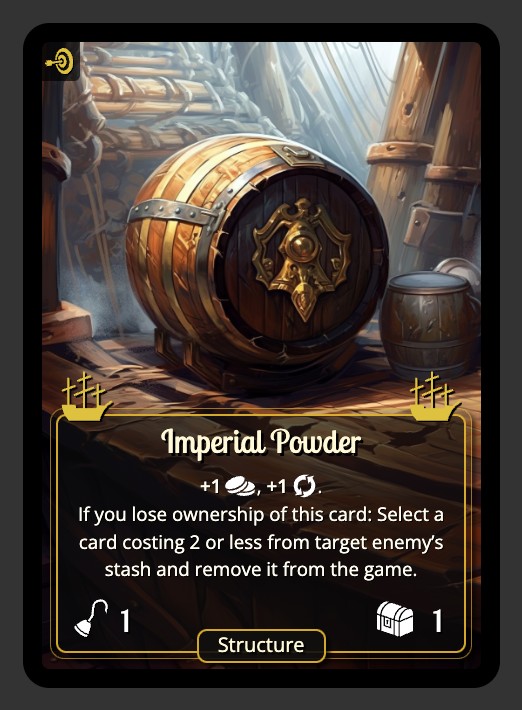
Imperial Powder
Imperial Powder is a highly volatile package, primed to explode at any moment. The question is, can you dispose of it before the game ends? Perhaps a Typhoon event will set it off? If that happens, and you pass Imperial Powder to your opponent (thus losing ownership) you might target Imperial Powder itself for destruction. If you do, the explosive effect triggers again, but for your neighbor's benefit. I'll let you imagine the explosive consequences.
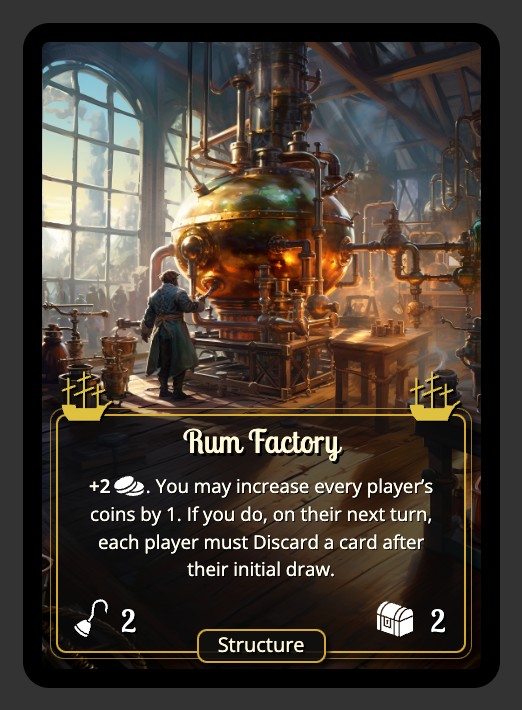
Rum Factory
What starts like a generous gift might end up causing a heavy hangover.
Rum Factory can provide the reach you need to access a desirable card.
Alternatively, luck might favor you on the next turn, allowing you to discard a start-of-turn card, already placing it where you want it for your following turn.
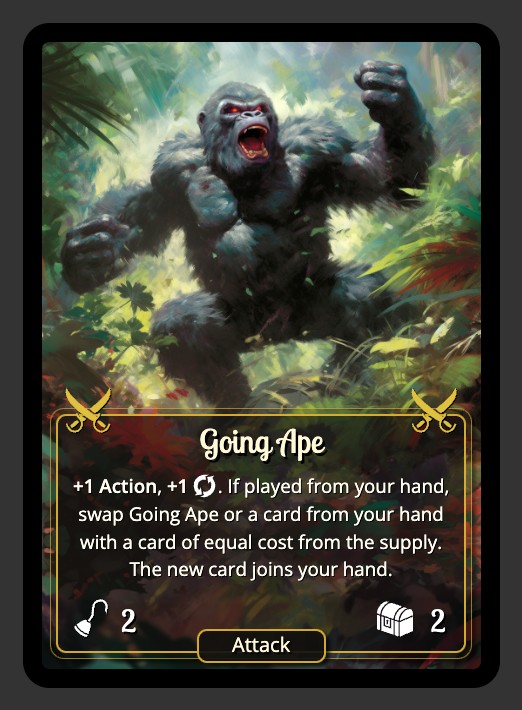
Going Ape
Going Ape offers incredible flexibility, allowing you to swap a card from your hand with any other card from the supply of the same cost without consuming an Action. This includes the possibility of swapping Going Ape itself if it serves your strategy. If you do that Going Ape ends up in the supply and not in your discard.

Voodoo Curse
A powerful card if you can hit a good card from your opponent. Voodoo Curse can even be played on yourself. This is because it uses "target player" rather than "target enemy". Other cards in DeckHand offer similar flexibility, such as Lost Expedition.
Cards like Voodoo Curse, which do not use the "discard" keyword, do not trigger the "When discarded" effects of affected cards. For a card to be discarded, it has to be in someone's hand first.
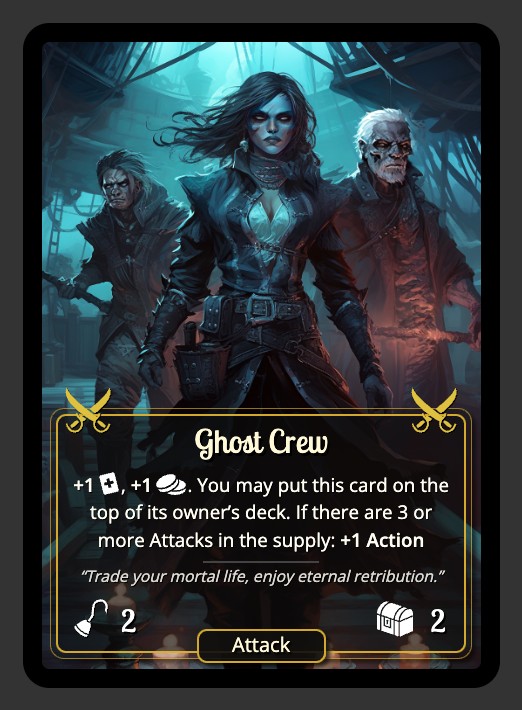
Ghost Crew
The peculiar wording on Ghost Crew is there to avoid a catastrophic interaction with cards such as Voodoo Curse or Kraken's Fury.
If this card were to simply state "on top of your deck", playing Voodoo Curse on it would allow you to place it on top of your own deck, effectively taking it away from your opponent.
In DeckHand, you own all the cards from your hand, deck, and stash unless a steal, remove from the game, or swap effect occurs. Putting a card aside, such as with the Lost Expedition effect, does not change the ownership. At the end of the game, all the cards you own contribute to your victory points.

Skull Island
Everyone reveals a card. Then you (and only you) have the option to swap one of them with a card from the supply. All revealed cards, including the newly swapped one, go back on the top of their respective decks.
A swap can only occur if there are two valid cards to exchange; otherwise, nothing happens.

Emperor's Caprice
You can gain a powerful effect if your opponent allows it. The two reloads can also prove valuable in combination with other cards.
If, for any reason, the effect of the chosen card makes it leave the supply, like in the case of choosing Gambling Addiction and reloading it, the card's effect continue as long as it remains valid.
Once a card's effect begins resolution, it detaches from the card itself and should be brought to its conclusion.
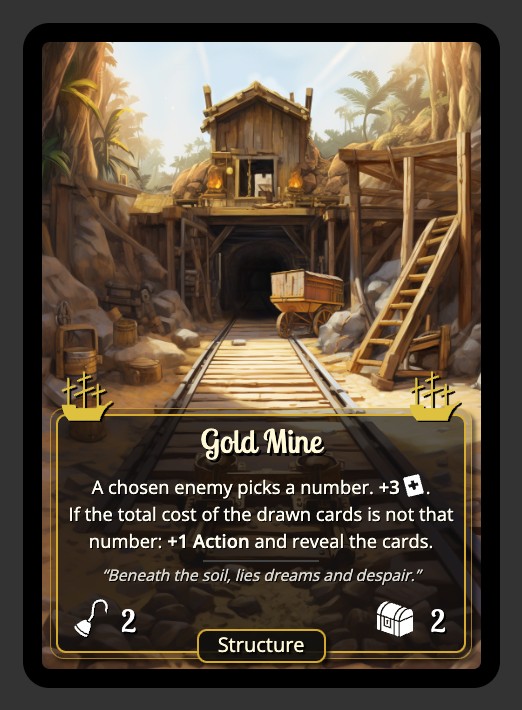
Gold Mine
Present your opponent with a challenging task: predicting the combined value of your next 3 cards. If they haven't been closely monitoring your stash, this could prove quite difficult for them. Should they fail, you strike gold without expending an Action.
The 3 draws are sequential and optional, so you might draw none, one, or continue up to 3.
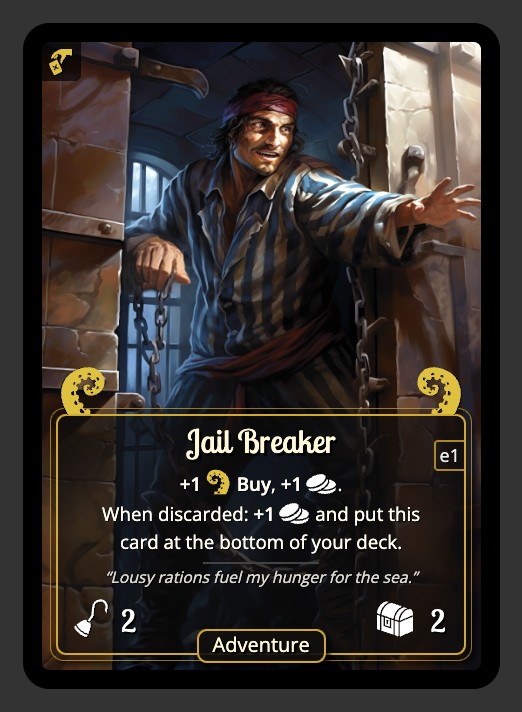
Jail Breaker
The Jail Breaker is eagerly waiting to break out of your deck and embark on an adventure. If you do not send him on one, he will simply re-enter your deck automatically to wait for a better time to escape.
This card is part of the Crew expansion and introduces a new concept: a Buy action with a card type restriction. In this case, the Buy action can only be used for an adventure card.
Crew Expansion Rules
In the free expansion, a new type of cards called Crew is introduced. These cards reside in a separate Crew deck. To hire a Crew during the game, make use of an action to secretly look at the top 3 cards of this Crew deck, put 1 in front of you face down, one back on top of the deck, and the last one at the bottom. (refer to the rules for complete instructions).
The Crew remains hidden until you choose to pay them 1 coin. Once paid, flip the Crew card face up, revealing their skills to the other players.
Revealing a crew or utilizing one of their skills does not count as an Action. However, you can only use one skill per turn and per crew.
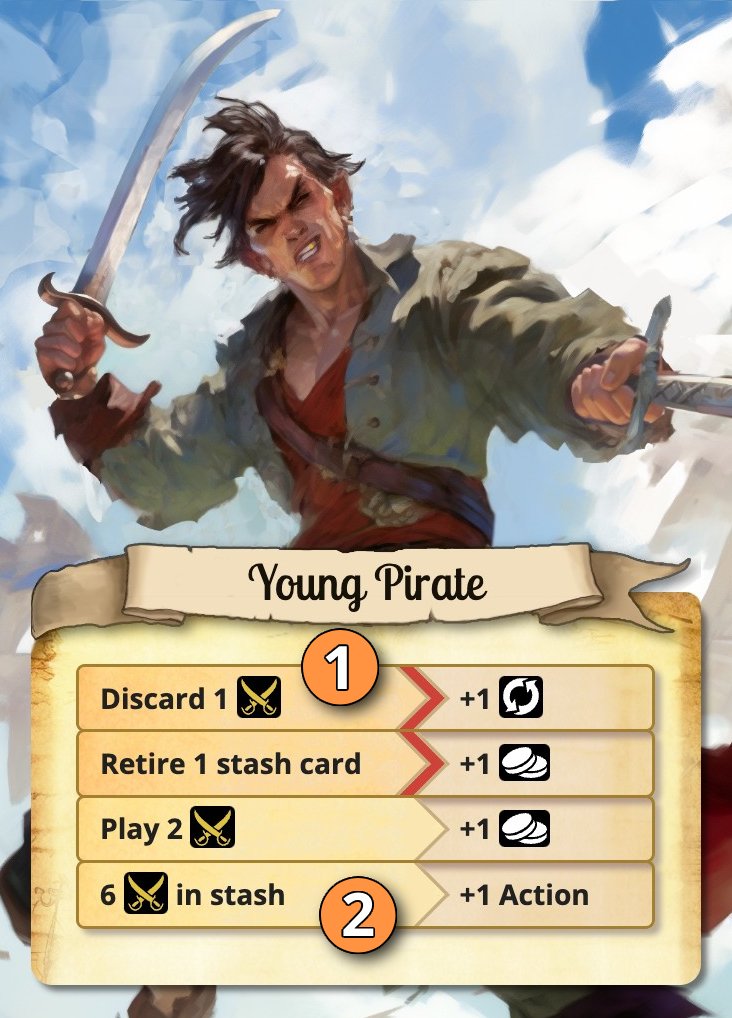
Young Pirate
-
The red arrow on this skill indicate the left side is a salary, not a condition.
The salary has to be paid by discarding an Attack.
If you already discarded an Attack by other means this turn, it doesn't count. It has to be discarded right there and then when you want to use the skill. -
As there is not red or green arrow, this skill is a condition. This means the left
part is a game state that you need to reach to be able to chose this skill.
In this case, you need to have at least 6 attacks in your stash to be able to activate this skill and gain an extra Action.
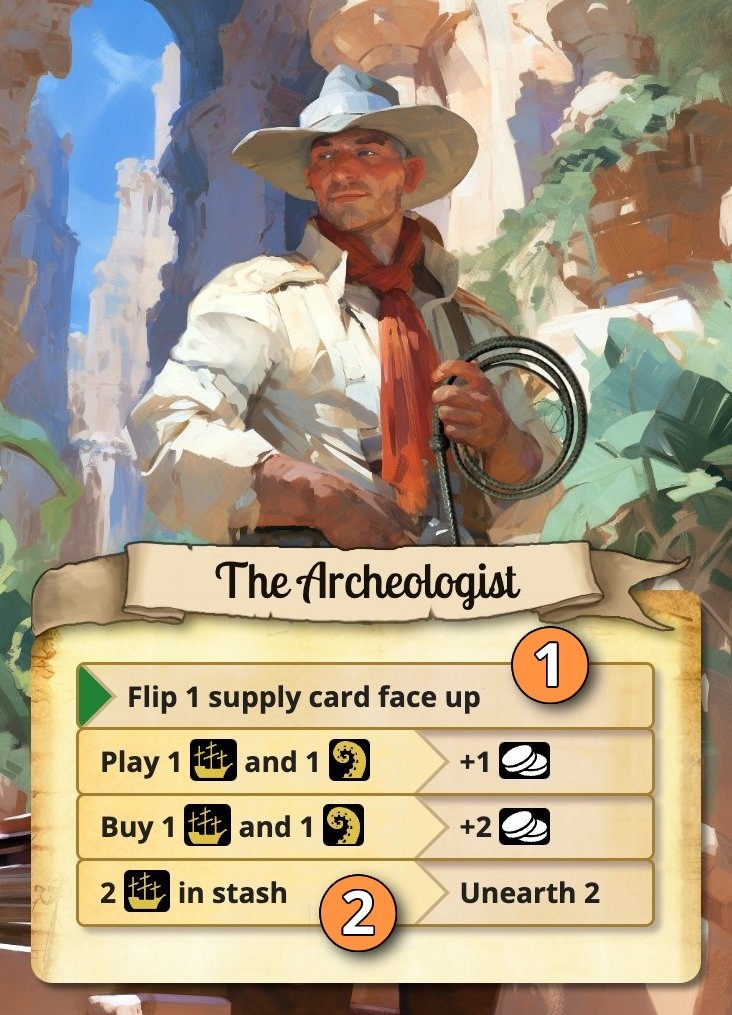
The Archeologist
- The green arrow on this skill indicates that the skill can be freely used every turn without any condition. In this case, to use this skill's effect, you would need to have a supply card face down, which is a result that a few cards can create (such as The Grand Council, Hidden Cove, Governor's Jail).
- When you unearth 2, it means you can select up to 2 cards from your stash and place them at the bottom of your deck.
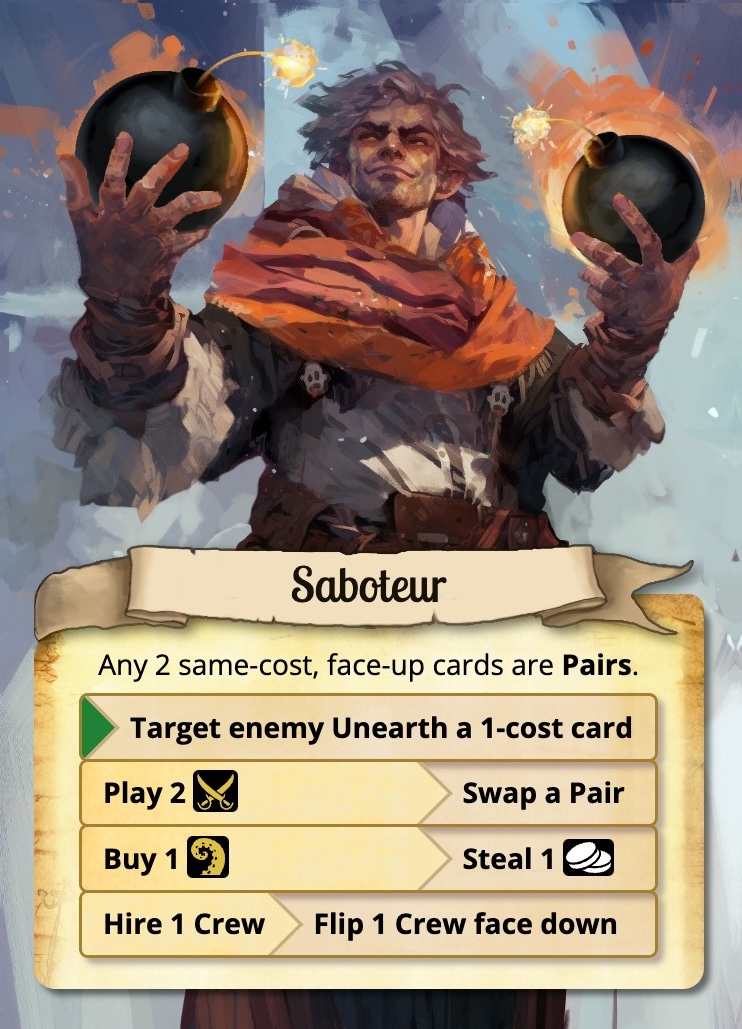
Saboteur
- The Saboteur's free skill forces an enemy to choose a 1-cost card from their stash and place it at the bottom of their deck.
- The Saboteur allows you to swap any face-up cards on the table after you have played 2 attacks. These could be cards in your stash, an opponent's stash, or even cards in the supply. Crew cards do not have a cost; therefore, it is not allowed to swap them.
- "Steal 1" means that you can decrease an enemy's coin count by 1 and increase your own by 1. If no enemy has any coins, you cannot use this skill.
- If you hired a Crew this turn, you can activate the Saboteur's last skill and flip any 1 Crew card face down, disabling it until its owner pays 1 coin to reactivate it.